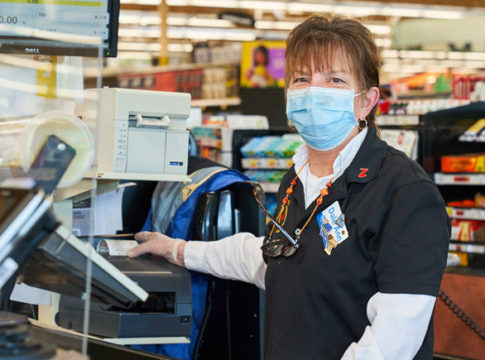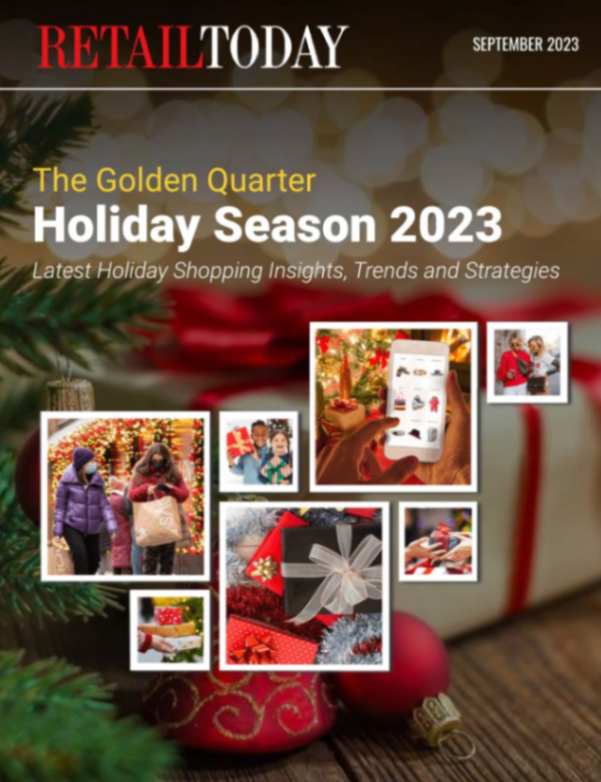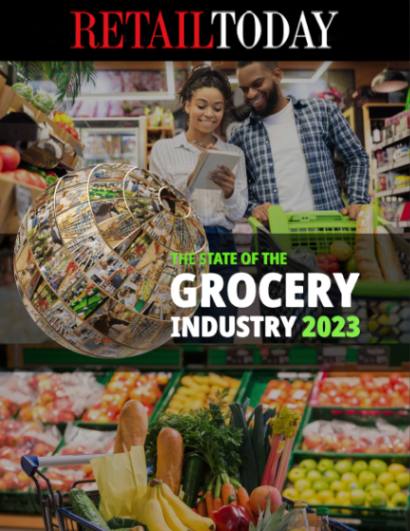The Kroger Family of Companies (NYSE: KR) today announced it has hired more than 100,000 workers in the past eight weeks, including those from the hardest-hit sectors like restaurants, hotels and food service distributors. Prior to the crisis, Kroger’s workforce topped 460,000 associates and recent hiring efforts have helped the retailer to provide continuous access to fresh, affordable food and essential products to communities during the pandemic.
“Throughout the pandemic, Kroger’s top priority has been to provide and maintain a safe environment for our associates and customers with open stores, comprehensive ecommerce solutions and an efficiently operating supply chain,” said Rodney McMullen, Kroger’s chairman and CEO. “Since March, we have invested to reward our associates and safeguard our associates, customers and communities.”
The Kroger Family of Companies has invested $700 million since March to reward associates and safeguard associates, customers and communities, all of which was contemplated in the guidance provided in a business update on April 1.
“In the coming months, we know that our associates’ needs will continue to evolve and change, and our commitment is that we will continue to listen, be responsive and make decisions that advance the needs of our associates, customers, communities and business,” continued McMullen.
Expedited Hiring and Onboarding Process
The Kroger Family of Companies initiated its expedited hiring process in early March to shorten the time between application and employment, onboarding new hires in an average of 72 hours. Kroger also adjusted its new hire approach to focus on tasks vs. role-based development, concentrating on culture and safety. This adjustment allows new hires to more quickly acclimate to their role and expectations.
The expedited hiring and onboarding process also reinforced Kroger’s continued focus on associate and customer safety, directing immediate support to the expansion of Kroger Pickup availability, as well as enhanced cleaning and sanitization practices in its stores and facilities.
“During these uncertain times, we’re humbled to be able to provide new career opportunities to workers in the industries most affected by this pandemic,” said Tim Massa, Kroger’s senior vice president and chief people officer. “Through our expedited hiring and onboarding process and cross-sector partnerships, we’ve welcomed more than 100,000 new associates to the Kroger Family of Companies in roles across our retail stores, ecommerce business, manufacturing facilities and distribution centers.”
In March, Kroger formed employment partnerships with local, regional and national businesses to create a shared-resource model that temporarily flexes employees to Kroger roles, ensuring the food supply chain continues without disruption. Current partners include Frisch’s, Marriott International, McLane Foodservice, Shamrock Foods, Sodexo, SodexoMAGIC, Sysco, Thunderdome Restaurant Group, US Foods, Waffle House and more.
Kroger’s Long-term Commitment to Raising Wages, Associate Benefits
In 2017, the organization launched Restock Kroger and announced that it would invest $500 million in associate wages as part of its business plan between 2018 and 2020.
As a result of this continuing investment in wages, Kroger has increased its average rate to over $15 per hour. As stated in November 2019, Kroger expects over the three-year time period to spend approximately $800 million in associate wage investments, which excludes the aforementioned COVID-19 associate investments.
“We provide our associates with health care and retirement benefits that many of our competitors do not offer their employees. This was true prior to the pandemic and remains true today,” continued Massa. “Kroger also provides retirement benefits in the form of pension investments for many of our frontline associates, which fewer than 9% of U.S. companies provide. With health care and retirement benefits factored in, Kroger’s average hourly rate grows from $15 to well over $20.”
In 2018, Kroger established Feed Your Future, an industry-leading education assistance program that offers associates—full or part time—up to $3,500 annually ($21,000 over the course of employment) toward continuing education and development opportunities including a high school equivalency exam, professional certifications and advanced degrees. Since launching, more than 5,000 associates have participated in the program, with 87% being hourly store associates. To date, Kroger’s investment in Feed Your Future surpasses $8 million.
Ways Kroger will continue to invest in, support and protect its associates:
- Offering COVID-19 testing to associates based on symptoms and medical need
- Providing Emergency Leave to associates most directly affected by the virus or experiencing related symptoms and providing paid time off
- Supplying masks for all associates and encouraging them to stay home if they are sick
- Encouraging customers to wear masks in stores, or alternatively, use ecommerce services
- Providing comprehensive benefits packages, including healthcare coverage and retirement benefits
- Offering $5 million through the organization’s Helping Hands fund to provide financial support to certain associates experiencing hardships due to COVID-19, including childcare costs
- Making available mental health resources
- Continued implementation of customer capacity limits and special shopping hour for senior shoppers and higher-risk customers
- Continued plexiglass partitions and physical distancing floor decals
- Expanding contact-free payment solutions like Scan, Bag, Go and Kroger Pay
- Offering a no-contact delivery option, low-contact pickup service and ship-to-home orders
Sharing What We’ve Learned: A Blueprint for Businesses
As businesses across America begin to reopen, Kroger has created a resource guide that includes actionable recommendations and learnings the organization has applied in the last eight weeks to safeguard its associates, customers, and communities, as well as what it has learned through regular interaction with business leaders in other countries that are ahead of the U.S. in terms of the pandemic cycling through their countries. Today, the organization is releasing its fifth installment of Sharing What We’ve Learned: A Blueprint for Businesses, focusing on protection of the supply chain. The resource is available to download at KrogerBlueprint.com.
This press release contains certain statements that constitute “forward-looking statements” about the future performance of the company, including with respect to Kroger’s investment in associate wages. These statements are based on management’s assumptions and beliefs in light of the information currently available to it. Such statements are indicated by words or phrases such as “expect and “guidance.” Various uncertainties and other factors could cause actual results to differ materially from those contained in the forward-looking statements. These include the specific risk factors identified in “Risk Factors” in our annual report on Form 10-K for our last fiscal year and any subsequent filings as well as the following:
•Kroger’s ability to achieve sales, earnings, incremental FIFO operating profit, and adjusted free cash flow goals may be affected by: labor negotiations or disputes; changes in the types and numbers of businesses that compete with Kroger; pricing and promotional activities of existing and new competitors, including non-traditional competitors, and the aggressiveness of that competition; Kroger’s response to these actions; the state of the economy, including interest rates, the inflationary and deflationary trends in certain commodities, changes in tariffs, and the unemployment rate; the effect that fuel costs have on consumer spending; volatility of fuel margins; changes in government-funded benefit programs; manufacturing commodity costs; diesel fuel costs related to Kroger’s logistics operations; trends in consumer spending; the extent to which Kroger’s customers exercise caution in their purchasing in response to economic conditions; the uncertain pace of economic growth; changes in inflation or deflation in product and operating costs; stock repurchases; Kroger’s ability to retain pharmacy sales from third party payors; consolidation in the healthcare industry, including pharmacy benefit managers; Kroger’s ability to negotiate modifications to multi-employer pension plans; natural disasters or adverse weather conditions; the effect of public health crises or other significant catastrophic events, including the coronavirus; the potential costs and risks associated with potential cyber-attacks or data security breaches; the success of Kroger’s future growth plans; the ability to execute on Restock Kroger; and the successful integration of merged companies and new partnerships. Our ability to achieve these goals may also be affected by our ability to manage the factors identified above. Our ability to execute our financial strategy may be affected by our ability to generate cash flow.
Kroger’s ability to achieve these goals may also be affected by Kroger’s ability to manage the factors identified above.





